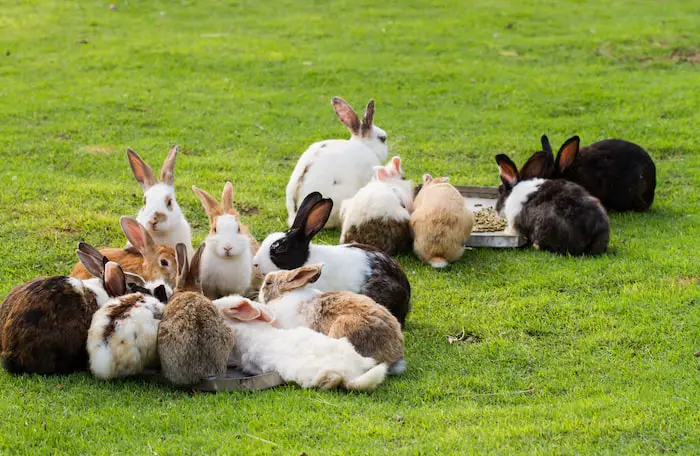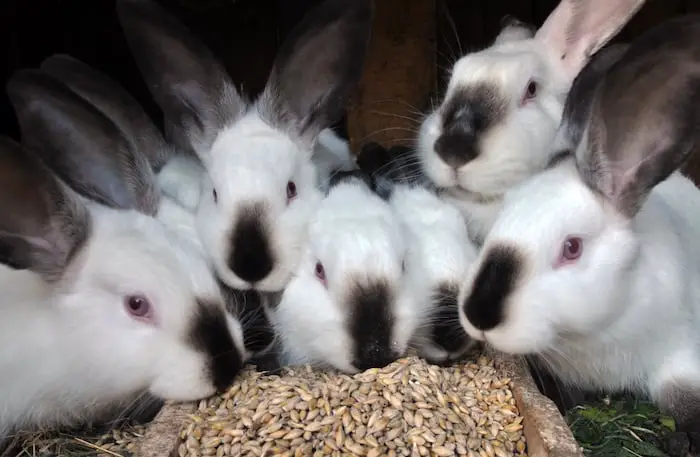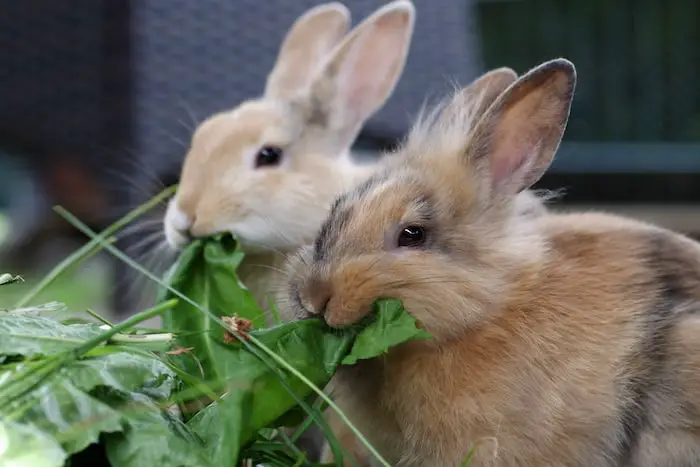Rabbits love to eat, and they can eat tons of food if left unsupervised. In the wild, bunnies can spend a lot of time grazing as they are herbivorous animals. This behavior leads us to ask ourselves: will bunnies overeat? The answer is yes. Rabbits will eat everything they can if left unsupervised, which sometimes can become problematic.
Will Bunnies Overeat?
Rabbits will overeat if given a chance. As opposed to us who eat until we feel satisfied, rabbits do not have this alarm. As long as there is food at their disposal, they can eat continuously. Once again, we can attribute this behavior to their nature and adaptation to different environments throughout the years.
In nature, a wild rabbit will mainly rely on the grass to feed and get all the nutrients it needs to survive. Although it is very nutritious, this diet is deficient in calories, so they are forced to eat most of the day to obtain the calories that their bodies require to survive. If they ever find any food with high caloric content, they will take advantage of the opportunity to eat it and get the most out of this meal.
Why Do Rabbits Overeat?
Like many other animals, rabbits will overeat if they have the resources at their disposal. They will take advantage of the periods in which the food is abundant in preparation for those moments in which there are more food shortages. So, this is an instinctive behavior for the rabbits.
Another reason why rabbits can overeat is because of the design of their digestive system. Their digestive system works in a pushing way; that is, bunnies need to eat continuously so that the transit in their digestive system keeps flowing. It is for this reason that they ingest food very frequently. It is up to us to provide them with food that helps their intestinal transit without being an excessive load of calories.

How Do Pet Rabbits Differ from Wild Rabbits on This Matter?
Pet rabbits have a greater quantity and variety of food at their disposal in our homes. This availability represents a great advantage for them as they do not have to go through many struggles to get the nutrients they need. But even so, they will keep their instinct alive, as they will want to eat everything within their reach.
They are also prone to picking the highest-calorie foods compared to the healthier ones if given both options. If they have the opportunity, they will overeat on vegetables, fruits, pellets, and anything else before eating their hay. They are like small children that prefer to eat candy instead of healthy veggies.
The problem worsens if the rabbit lacks other activities in which it can be kept busy. A solitary rabbit that lacks other activities or remains most of its time locked up will have no other choice but to spend its time eating. Hence the importance of offering them other activities which will distract them. Domesticated rabbits usually have many meal options available, and so they tend to overheat much more often than wild rabbits.
What Sort of Problems Can a Rabbit Develop by Overeating?
Overeating can mean a big problem as it can lead to illnesses which can have negative consequences as its digestive system is so delicate. If this behavior becomes routine, various issues can arise:
Obesity
Just like it happens with our bodies, if rabbits consume excessive calories, they will also begin to suffer from obesity. An obese rabbit will, in turn, develop many secondary problems such as:
- They will develop a lot of difficulties to hop.
- They will not be able to groom themselves adequately, leading to other issues like urine scalding.
- Obese rabbits can develop heart diseases like congestive heart failure and other heart diseases, often fatal.
- An excess of weight can trigger other problems like atherosclerosis Rabbits can develop fat plaques in their arteries. With time, these plaques can block the arteries, leaving the organs without a sufficient blood and oxygen supply, which can be fatal.
- Fatty liver disease
- They can develop arthritis, which can limit their movements further.
- Respiratory illnesses
- Bladder sludge and stones due to excess in protein consumption.
These are only some of the many other conditions which bunnies can develop due to obesity.
Constipation or Diarrhea
If the amount of fiber is deficient, a rabbit can present constipation and even gastrointestinal stasis. On the other hand, a diet high or excessive sugars can cause an imbalance in its gut bacteria, leading to diarrhea. Remember that sugars can ferment in the gut, which causes these problems. A rabbit that suffers from diarrhea can become dehydrated and die quickly.
Dental Problems
Bunnies teeth grow continuously. Rabbits need to eat a lot of hay to keep their teeth trim and healthy. A rabbit that feeds mostly on pellets and treats will not consume an adequate amount of hay, so its teeth will grow disproportionately. Also, the excess of sugars can produce tooth decay.
Gastrointestinal Stasis
This condition is widespread and can be deadly if left untreated. Stasis occurs when the bunny digestion slows down or stops altogether. Overeating is one of the causes of gastrointestinal stasis.
Another primary reason for stasis is an imbalance in essential nutrients, as an excess of carbohydrates and a lack of fiber in the diet. When the gastrointestinal flow stops, the rabbit will stop eating and defecating, becoming a deadly condition if not attended to in time.
How Can We Plan A Healthy Diet for Our Rabbit?
A healthy diet should be a balanced diet:
- First, 80% of your bunny’s diet should consist of hay such as Timothy, Meadow, or Orchard. It will provide all the fiber a rabbit needs to keep its gut flowing and in top condition. It is nearly impossible for a rabbit to overeat hay. Hay also helps to prevent hairball blockages in their digestive systems. Beware of alfalfa. Alfalfa hay has higher protein and calcium content that makes it not ideal for an average adult rabbit. If given to a rabbit over a long time, alfalfa can contribute to the formation of bladder sludge and bladder stones.
- Second, 15% of the diet should consist of leafy greens. Leafy greens supplement your rabbit’s diet with the nutrients they need. They also provide the opportunity for your pet to experiment with new flavors and textures. The amount to feed will depend on your rabbit’s weight. For example, a 2-pound rabbit will be able to eat up to 1 cup of leafy greens per day. From two pounds on, you can increase by half a cup for every pound of weight. Talk to your vet and make sure that you know which vegetables are best for your rabbit. Not all vegetables are recommended, as is the case with Iceberg lettuce.
- In third place are pellets. Pellets should make 4% of a rabbit’s diet. They are a good source of protein for your rabbit but should only be given in limited quantities, about 1 Tablespoon of pellets per pound of body weight or about ¼ to a cup per day.
- Fruits and treats such as apples, carrots, and bananas make 1% of the diet. Although you can offer your rabbit fruits from time to time, it is recommended that you do so in minimal quantities, between 1 to 2 tablespoons per day. Rabbits love to eat fruits and treats, but these foods in excess can cause overweight and cause an imbalance in their intestinal flora. Sugars also tend to ferment in the intestine, which can cause diarrhea and severe intestinal problems.
- Finally, it is water. As is the case with hay, rabbits should have unlimited access to freshwater. It would be best if you replenished their water bowl or water bottle with fresh water daily.
Remember that if all these types of foods are available simultaneously, a bunny will always choose to eat the pellets, fruits, and snacks first instead of eating the healthy hay. Therefore, we must pay attention to the amount of food we offer our pet rabbits and their eating schedules.

How to Keep a Rabbit from Overeating?
Here are some things we can do to keep your rabbit from overeating:
- Limit the number of dry pellets and treats you give your rabbit. These types of food have a high caloric content, so they are responsible for your rabbit developing obesity.
- Offer plenty of hay. Please do not limit the amount of hay you give your rabbit; it is the only food that you should offer in unlimited quantities. Hay is essential for their digestion to run smoothly.
- Limit the number of fruits and treats you give them every day. Bunnies love sweet things and will surely beg you to provide them with more, but you must be strong and not give in to their pleas for their wellbeing.
- If you have more than one rabbit, separate them while they eat their pellets or snacks. Rabbits usually eat very quickly, so the one that finishes first will try to eat the food on its partner’s plate.
- Offer toys to keep them busy and entertained. This way, they will spend their time in other activities, slowing down the munching.
- If you keep them in a cage at all, reduce the time they spend there as much as possible. In fact I recommend all rabbit owners to think of arrangements where you can have an open cage at all times. Rabbits love to explore their surroundings, and by being outside their cage, they will be able to carry out this activity and stay away from food for some time. It is also suitable for their health to get some exercise, especially if they are already overweight.
No matter how much they eat, rabbits always seem to be ready to eat a lot more. It is in our hands to allow their behavior to increase and become a delicate health problem or control their feeding to have an adequate diet and a much healthier life.

